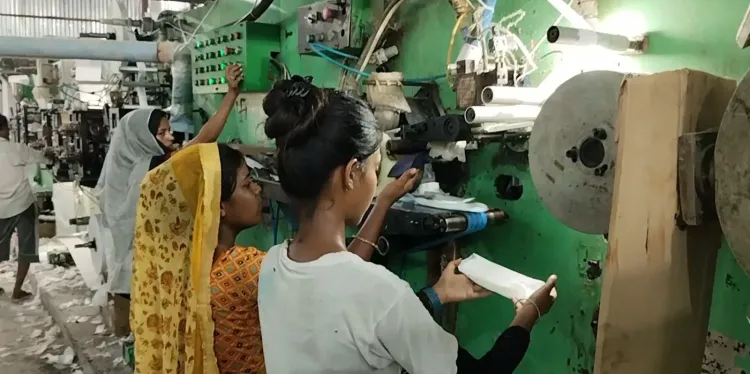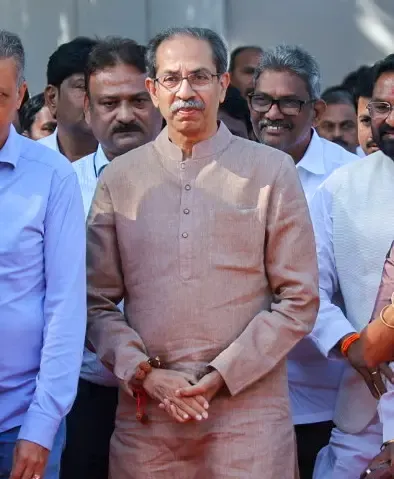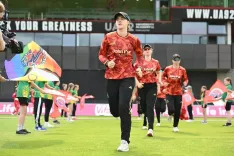How are SHGs in Neemuch district inspiring women's empowerment?

Synopsis
Key Takeaways
- Empowerment through Enterprise: Women in Neemuch are transforming their lives and community through business.
- Breaking Taboos: The group is challenging societal norms surrounding menstruation.
- Supportive Networks: Collaboration with NRLM has been crucial for their success.
- Health Advocacy: They promote menstrual hygiene awareness in their community.
- Inspiration and Innovation: Their journey is a testament to the power of courage and creativity.
Neemuch, July 8 (NationPress) A remarkable women's self-help group in the Neemuch district of Madhya Pradesh has emerged as a beacon of women’s empowerment, revitalizing their village's economy and lives through the innovative production of sanitary pads.
With the backing of the National Rural Livelihood Mission (NRLM), the women of Khor Gram Panchayat have transformed a daring concept into a flourishing enterprise that promotes health, dignity, and self-sufficiency.
It is often said that no task is insurmountable if one possesses courage, and the Nari Swabhiman Self-Help Group of Khor village exemplifies this belief. Established during the challenging times of the COVID-19 pandemic, this group of relentless women not only forged their own identity but also set a standard for others to emulate.
Motivated by the film Padman, they initiated the manufacture of sanitary pads to enhance menstrual hygiene and women's health in their community, bestowing upon themselves—and many others—a renewed sense of dignity and self-worth.
Dubbed Nari Swabhiman (Women’s Self-Respect), the group’s journey took flight thanks to the initiatives aimed at empowering women by Prime Minister Narendra Modi and NRLM’s mission to provide sustainable livelihoods in rural India.
The group secured its first significant opportunity during the pandemic when they were granted a contract to produce PPE kits, along with financial support of Rs 3 lakh. This initial success laid the groundwork for their subsequent achievements.
Currently, these women manufacture hygienic, safe, and budget-friendly sanitary pads in large quantities, priced below market rates. Their work not only financially supports their families but also raises awareness about menstrual hygiene.
Through their “Nari Swabhiman Sanitary Pads,” they are empowering women to live confidently and healthily, dismantling age-old stigmas in the process.
The group’s president, Mona Khoiwal, recounts the inception: “In 2020, twelve of us from the village united to establish this self-help group. During the Corona period, we began by producing PPE kits. Later, with the Rs 3 lakh loan under NRLM, we acquired a small machine for manufacturing sanitary pads. We traveled from village to village, discussing menstrual health and the importance of using pads. Akshay Kumar’s movie Padman was a significant inspiration for us—it demonstrated what was achievable, and we endeavored to inspire other women as well. Now, with larger machines, we’re fulfilling substantial orders from across India. We are immensely grateful to Modiji for his commitment to women’s empowerment.”
The success story doesn’t end there. As demand surged, so did their production capacity. The group expanded their operations by investing in advanced machinery, enabling them to meet increasingly large orders from various regions of the country.
Bharti Nakwal, another devoted member of the group and a resident of Khor village, shared her insights:
“We produce sanitary napkins here under the brand name Nari Swabhiman. Mona Khoiwal is our group's operator. We’ve been in operation for 5–6 years now. Initially, we crafted them by hand, but as demand escalated, we upgraded to larger machines. Each morning, we start the machines and use pulp, stickers, and other materials to manufacture the pads. Some of us run the machines, while others weigh and package the napkins.”
Bharti elaborated on the motivation behind their mission: “Previously, women used cloth, which often led to infections and diseases. We aimed to change that and safeguard women’s health. This motivated us to start this napkin business. Approximately 10–15 women work here daily. We receive orders worth Rs 5–8 lakh that we complete in 8–10 days. We take great pride in our work—it’s purposeful and helps protect women from diseases.”
NRLM is a poverty alleviation initiative implemented by the Ministry of Rural Development, a division of the Government of India. This program emphasizes promoting self-employment and organizing the rural poor. The core idea is to organize the impoverished into SHGs and equip them for self-employment.










